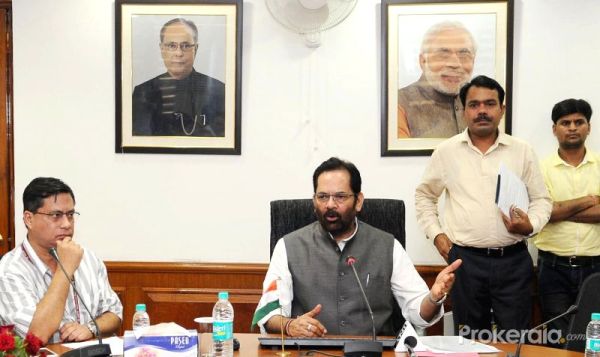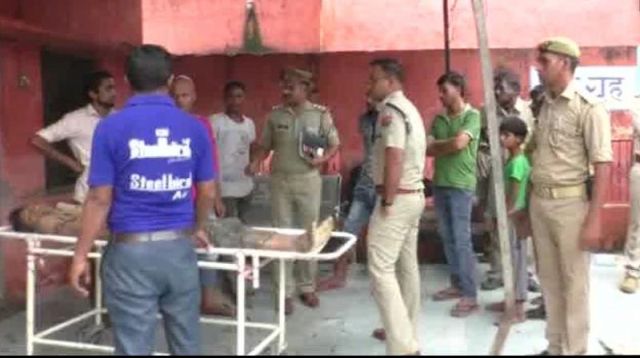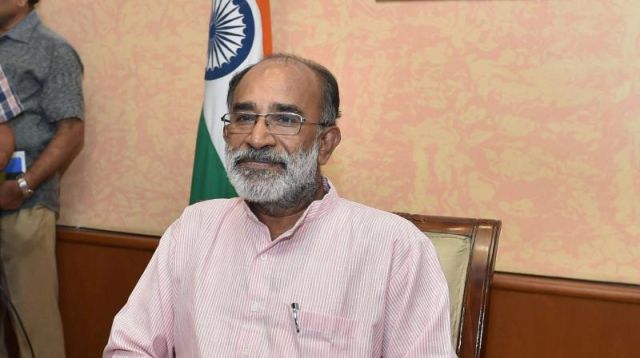
by admin | May 25, 2021 | News, Politics
 Srinagar : Life across the Kashmir Valley was adversely affected on Friday by a separatist-called protest shutdown to voice support for Article 35A.
Srinagar : Life across the Kashmir Valley was adversely affected on Friday by a separatist-called protest shutdown to voice support for Article 35A.
Joint Resistance Leadership (JRL), a conglomerate of separatists headed by Syed Ali Shah Geelani, Mirwaiz Umer Farooq and Yasin Malik called a complete shutdown on Friday to highlight support for the article.
All shops, public transport, other businesses and educational institutions remained closed in Srinagar and other places in the valley.
Attendance in government offices, banks and post offices was badly affected because of non-availability of public transport in the city and other districts of the valley.
Post-graduate entrance exams have already been rescheduled because of the shutdown. Rail services between Baramulla and Bannihal towns were also suspended for the second consecutive day.
Authorities imposed restrictions in several areas — Khanyar, Rainawari, Nowhatta, M.R.Gunj, Safa Kadal, Kralkhud and Maisuma to maintain law and order, police said.
Heavy deployments of police and paramilitary forces have been made in areas placed under restrictions and other law and order sensitive places in the Valley.
Article 35A of the Constitution empowers the Jammu and Kashmir legislature to define the states ‘permanent residents’ and their special rights.
It has been challenged in the Supreme Court through a bunch of petitions being heard by a three-judge bench on Friday.
—IANS

by admin | May 25, 2021 | News, Politics

Mukhtar Abbas Naqvi
New Delhi : The foundation for the first of the five proposed “world class” educational institutes for minorities is set to be laid early next month, Union Minority Affairs Minister Mukhtar Abbas Naqvi said on Thursday.
Naqvi said that 16-acres land has been acquired in the Mewat district of Haryana at a “scenic locale” and its foundation would be laid in the first week of September.
“Mewat, being the most backward district, needs such an institute more than any other place in the country. We hope the institute would be ready and running by 2021,” Naqvi said.
He said the institute would have a provision of education from primary up to the diploma and degree levels besides centres for skill development.
It will also have a coaching centre for competitive exams besides hostels with modern facilities, he added.
“It will be an education, skill and a knowledge hub,” he said.
The Minister clarified that the institute would be open for all communities.
The Maulana Azad Education Foundation would be the governing body of the institute but it would be run by “reputed private and government organisations”.
“We are in talks with a few Indian and foreign organistations which have shown interest in running this institute on the PPP (public-private-partnership) mode,” Naqvi said.
—IANS

by admin | May 25, 2021 | News
 Lucknow : A man was beaten to death by a mob in Bareilly, Uttar Pradesh, early on Thursday on suspicion of stealing their cattle, police said.
Lucknow : A man was beaten to death by a mob in Bareilly, Uttar Pradesh, early on Thursday on suspicion of stealing their cattle, police said.
Superintendent of Police Abhinandan Singh said three persons have been arrested.
The victim was identified as Shahrukh Khan (20), who worked as a tailor in Dubai and had come home for Eid.
The incident happened in Bholapur Hindoliya village where more than 50 persons attacked four young men when they found them in their cattle yard. The youths were thrashed by the mob and handed over to the police later.
The villagers have filed an FIR against Shahrukh and two others, alleging cattle theft.
Police say there were three persons in all who were involved in the theft of buffaloes from the cattle yard of a local Gajendra Pal. When they along with other neighbours Virendra, Khempal and Mukesh Kumar started a hunt for the missing buffaloes, they spotted these four young men trying to cross the Nakatiya river.
The other two alleged thieves Pappu and Abid of the Thiriya Nijawat Khan village knew how to swim and fled while Shahrukh was stranded on the banks.
Villagers attacked him and beat before handing him over to the police.
He was admitted to the district hospital around 7:30 am where he died in front of his family members and relatives. The post-mortem report has revealed that the 20-year-old died of internal injuries inflicted primarily to the liver and kidneys.
The victim’s family members have refuted charges of theft and informed the police that Shahrukh had gone out late night after receiving a phone call rom one of his local friends.
“The police informed us later about the incident. We found him in the district hospital,” a family member said.
There have since been two FIRs: one from Gajendra Pal, who alleged that his buffaloes were being stolen; and the other by family members against two dozen persons accusing them of mob lynching.
Western and central UP have witnessed a few similar cases of mob lynching sparked by cattle theft.
Anand Kumar, Additional Director General of Police (ADG, Law and Order) told IANS that he had sought a report on the incident. “I am awaiting details” he added.
—IANS

by admin | May 25, 2021 | News, Politics
 New Delhi : A committee of secretaries, formed to deliberate and make recommendations for a separate law to deal with the incidents of lynching, has submitted its report to Group of Ministers (GoM) headed by Union Home Minister Rajnath Singh, officials said on Wednesday.
New Delhi : A committee of secretaries, formed to deliberate and make recommendations for a separate law to deal with the incidents of lynching, has submitted its report to Group of Ministers (GoM) headed by Union Home Minister Rajnath Singh, officials said on Wednesday.
The panel headed by Union Home Secretary Rajiv Gauba consulted a cross-section of society and other stakeholders before submitting the report to the GoM, a Home Ministry official requesting anonymity said.
The GoM, which includes External Affairs Minister Sushma Swaraj, Road Transport Minister Nitin Gadkari, Law Minister Ravi Shankar Prasad, and Social Justice and Empowerment Minister Thaawar Chand Gehlot, will examine the recommendations and submit its report to Prime Minister Narendra Modi.
The committee was formed by the government post a Supreme Court verdict in mid-July to examine ways to crack down on rising incidents of lynchings and mob violence across the country. The apex court had said it is the “responsibility of the government to protect the citizens”.
The apex court had asked the government to examine bringing out a separate law to crack down on such offences so that it can instil a sense of fear in the perpetrators.
The details of the report have not been made public since the GoM is yet to consider it, the official said, adding the panel has explored the possibility of treating lynchings as a separate offence under the Indian Penal Code (IPC) or making a separate law for the same.
In separate discussions with the Home Ministry earlier this week, the Law Ministry had examined the matter and felt that treating the offence under a separate section in the IPC, which would define mob lynching, could be an immediate step to begin with.
“A final decision on the new law will be taken at the level of the Prime Minister once the GoM forwards its suggestions to him,” the official said.
The panel, which includes secretaries of the departments of Justice, Legal Affairs, and Social Justice and Empowerment as its members, was formed by the Union Home Ministry in the wake of lynchings that claimed over 35 lives in nine states in the past one year.
In July, the Home Ministry issued advisories to states and Union territories following the Supreme Court’s directive to check incidents of lynching.
The Centre asked the states to appoint an officer in each district at the level of Superintendent of Police, set up a special task force to gather intelligence, and closely monitor social media contents to prevent mob attacks on suspicion of being child-lifters or cattle smugglers.
—IANS

by admin | May 25, 2021 | News, Politics

K.J. Alphons
By Gaurav Sharma,
Beijing : Incidents of lynching have hurt India’s image, Tourism Minister K.J. Alphons, who is in China to draw in more tourists, has admitted.
The minister, however, said that the ban on beef has not affected tourism in the country and sought to debunk a survey showing India as the most unsafe country for women in the world.
“Well, it (lynching) shouldn’t happen. Simple. And, the Prime Minister (Narendra Modi) has called them criminals. And, he told the states you have to take action because law and order is a state subject,” Alphons said on Tuesday interacting with Indian journalsits.
Asked if incidents of lynching have affected tourism in India, the Minister said: “Well, not on a big time basis…not really. But anything happening like that is bad for the reputation of the country. We won’t say it’s good for the reputation of the country.”
Has the ban on beef kept foreign tourists away from India, Alphons said that was not the case. “Not really… you see there are states like Kerala, Goa and the Northeast… these are all beef eating states.”
“These are all big tourism destinations… So people would go wherever they are comfortable
“I think we need to respect the sentiment of the people anywhere… that’s so fundamental.”
India has witnessed incidents of lynching over cow slaughter and beef eating in the country. The majority of Hindus in the country consider the animal as sacred.
Alphons is visiting China to attract Chinese tourists who currently generate some 21 per cent of tourism receipts in destinations in the world. He opened a road show in Beijing on Tuesday and will visit Shanghai and Wuhan.
Despite swelling number of outbound Chinese tourists, Indian receives only a very small fraction of them.
“Last year, 144 million Chinese were abroad, but only 300,000 came to India,” the minister said.
He said India plans to get at least 14 million Chinese tourists in the next three years.
Asked about women’s safety, an issue which is among the prime concerns among Chinese to visit India, Alphons said it was “a perception battle”.
He tore apart a recent survey by Thomson Reuters which said India is the most unsafe country for women.
“Thomson Reuters put out a story saying it’s (India) unsafe. We asked them how? They say they interviewed 540 people or something out which 43 from India.”
“You can’t ask the 43 so-called knowledgeable people of India whether India is safe or not because most of these so-called feminists would be anti-government … it is the politics of it,” he said.
—IANS

 Srinagar : Life across the Kashmir Valley was adversely affected on Friday by a separatist-called protest shutdown to voice support for Article 35A.
Srinagar : Life across the Kashmir Valley was adversely affected on Friday by a separatist-called protest shutdown to voice support for Article 35A.



